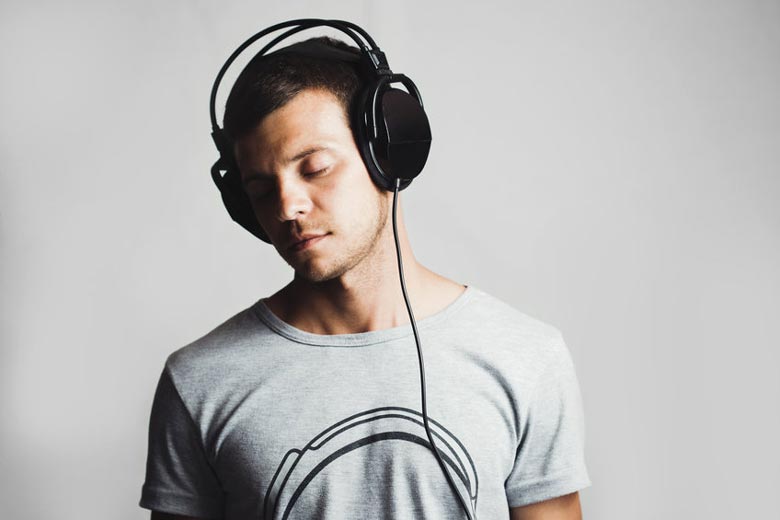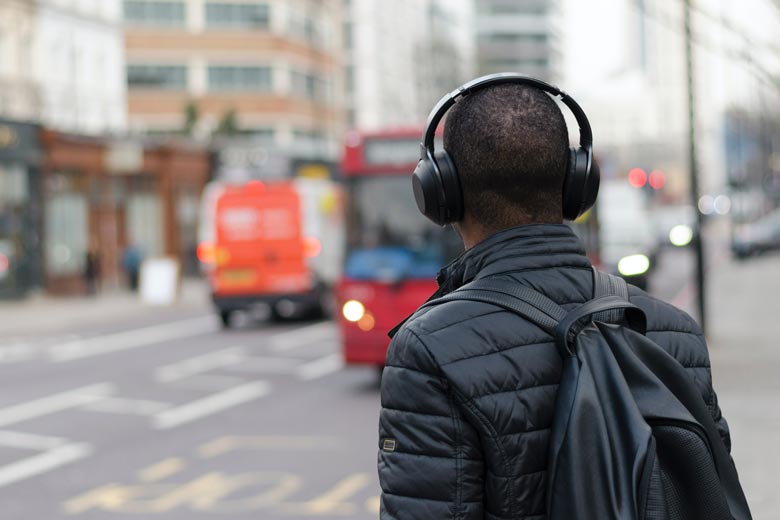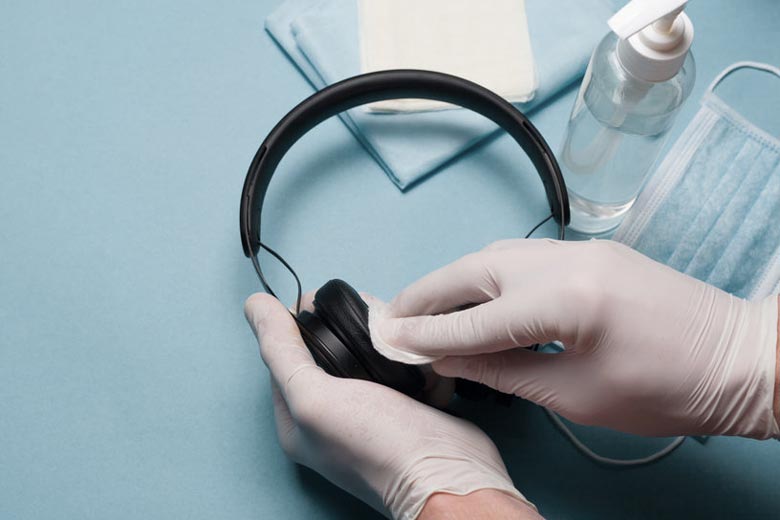Closed-back headphones are among the most popular audio listening gear for music lovers. They are perfect for listening to your favorite music on the go, and there are models for everyone, from kids to audiophiles. However, as they sit closely on your ears, you may wonder if they can damage your ear and hearing ability.
Closed-back headphones are the best option for your ears in a noisy environment. The blocking of ambient noise lets you lower the volume and minimize the risk of hearing loss. However, they can still be bad for your ears if you listen for longer periods of time. Also, closed-back headphones can give you ear infections.
This article explores why headphones can be harmful to our ears and how closed-back headphones can help us reduce these harms. You’ll also learn how to minimize damage to your ears by taking safety precautions.

Problems With Using Closed-back Headphones
Headphones are great devices that give us privacy while listening to music and create a pleasant listening experience. However, they can also be harmful depending on how we use them and what headphones we put on our ears.
Earphones are more likely to cause ear problems given their specific design. Since they sit directly and tightly inside the ear canal, they’re in close contact with the ear, magnifying any problem that can arise with other types of headphones.
Even though closed-backed headphones generally are better than other options, they are not risk-free.
Here are the main problems that closed-back headphones and other models can cause:
Affecting Hearing Ability
Noise-induced hearing loss is a common issue associated with the prolonged use of headphones. When you expose your ears to high sounds for a long time, you’ll damage the nerves and tiny hairs inside the air, which can lead to hearing loss.
Listening to high volumes significantly increases the chances of damaging your hearing ability. These high decibel noises have been compared to the constant buzzing of motorcycles engines.
While you may easily get annoyed by motorcycle noise, you’ll be more than happy to expose your ears to the same or higher decibel levels through music. Unfortunately, there’s no difference in the potential damage between music and motorcycle engine noise.
For example, a study conducted on 81 young people found that headphones (especially in-ear and closed-back models) can lead to hearing loss. It also showed that three hours of daily exposure to loud music can lead to permanent hearing damage, reducing hearing ability.
Related article: Can You Wear Headphones if You Have Tinnitus?
Ear Infection
You may be surprised to hear that headphones can cause ear infections because they don’t come in close contact with the ear canal.
Earphones are more likely to give rise to these infections, especially if you share them with other people. While that’s an obvious cause, closed-back headphones can also create these problems because they raise the temperature inside the ear.
Headphones, especially closed-back types, form a seal around your ears that doesn’t allow air to pass. As a result, sweating will increase and, combined with the higher temperatures, create an ideal condition for bacteria to grow inside the ears.
In this regard, open-back headphones would be a better option.
Closed-Back Headphones Influence Hearing Ability
One of the most important reasons people lean toward closed-back headphones is the better sound quality they offer by blocking out ambient noise. Their superior noise canceling features make them a perfect option for people who want to concentrate on the content they hear or listen to music in busy places.
In addition, the closed-back design of these headphones allows for a better bass quality. However, the sound quality they produce may not be as crisp and airy as the one produced by open-back headphones.
That said, they have an advantage over open-back headphones when it comes to being safe for the ears. Since they have noise-canceling properties, you’ll be less likely to play your music at high volumes. As mentioned, blasting music is one of the main reasons headphones are harmful to the ears.

So, with no distracting noise coming from outside, there’s no reason to play your music louder than usual. Of course, if you’re used to listening to really loud music, it doesn’t matter what headphones you use; you’ll need to kick this habit.
Open-back headphones could be a better option
As stated earlier, closed-back headphones are safer in noisy environments compared to open-back models because it reduces the surrounding sounds thanks to its design.
But if you exclusively listen to music in a quiet place without ambient noise, open-back headphones are actually a better option.
They are more ventilated which means that you don’t have the same problem with temperature and sweat. But there are also other aspectecs that makes open back headphones the better choice in some cases.
Read more about if and how open-back headphones are better for you ears.
How To Wear Closed-Back Headphones Safely
Although closed-back headphones can potentially damage your ears, you can easily avoid the potential issues. That’s because the way you use them is more important than the type of headphone. Here’s what you can do:
Lower the Volume
As mentioned, closed-back headphones are less dangerous than other types regarding high volumes because they block some of the outside noises that are the main reason people raise the volume. However, prolonged use of headphones can also be harmful even if you listen to lower volumes.
Therefore, it’s better to follow the 60/60 rule; don’t listen to more than 60% of the highest volume for more than 60 minutes. And if you catch yourself listening to higher volumes, reduce the length of time. You could take regular breaks to give your ears time to rest and reduce exposure to high volumes.
There are different ways to make sure you’re not listening to high volumes. One of them is to ask other people. If other people can hear your music even when you’re using closed-back headphones, you should lower the volume.
You could be more specific and make sure you’re listening to a safe decibel range. As a rule of thumb, it’s better to keep your music lower than 85db.
You could use apps that measure the volume and always keep the decibel within the safe range.
There are lots of free and easy-to-use apps on various platforms and operating systems. These apps limit the duration you listen to music and remind you to take breaks every once in a while. Other apps monitor and limit your sound exposure and tell you if your music listening is safe.
For example, Decibel X, free for iPhone, is an amazing app that features lots of functions in addition to measuring surrounding sounds’ loudness. You can control sound levels using your Apple Watch and measure sound levels from 30 dBA to 130 dBA. Unfortunately, Android users have to pay for the app.
Another great app is SPL Meter, which is free for Android. It allows you to measure frequencies between 40 and 120 decibels using its easy-to-navigate and intuitive user interface. SPL Meter is also available for iPhone, but it’s not free.
Maintain Hygiene
To avoid ear infections caused by headphones, never share your headphone with anyone. And if you do, wipe them down with antibacterial gel or rubbing alcohol before wearing them. This way, you’ll reduce the risk of spreading bacteria.

Keep the pads clean and change the rubber or sponge cover regularly. That’s more important when someone uses your headphones.
Alternatively, you could use rubbing alcohol or an antibacterial wipe to disinfect the cups and paddings.
Final Thoughts
Wearing headphones in, on, or over your ear can damage your hearing because you’re more likely to expose your ears to high sound volumes. However, headphones, especially over-ear types, are less harmful than earphones because they don’t sit directly inside the ear and create a distance between the sound source and the ears.
Closed-back headphones can be less harmful than open-back types because they block some of the outside noise and allow you to lower the volume. This feature is crucial because high volumes are the main cause of damage to ears and hearing loss.
